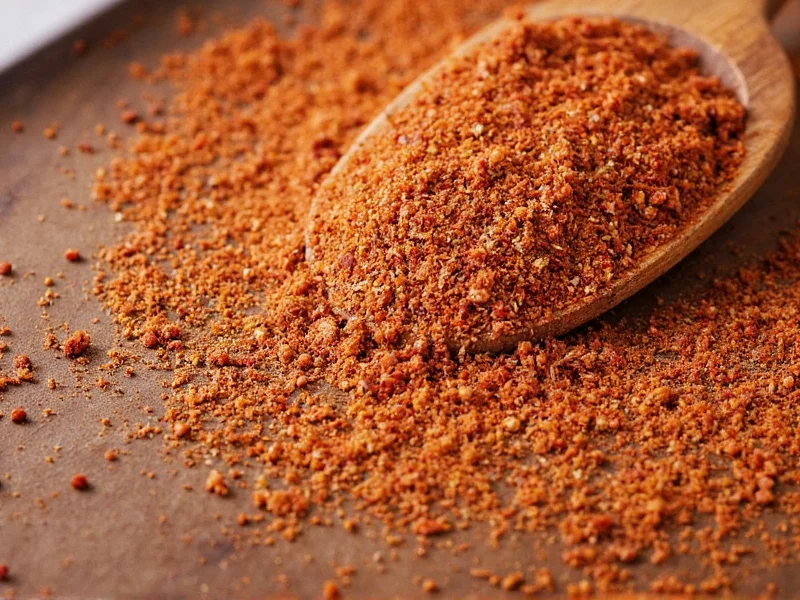Creating your own barbecue seasoning blend gives you complete control over flavors and quality. Unlike store-bought options that often contain fillers and excessive sodium, a homemade barbecue spice mix lets you adjust ingredients to match your personal taste preferences and dietary needs. Whether you're preparing for a weekend cookout or meal prepping for the week, having a reliable dry rub recipe in your culinary arsenal transforms ordinary proteins into extraordinary dishes with minimal effort.
Essential Barbecue Seasoning Components Explained
Understanding why each ingredient matters helps you become a better pitmaster. The foundation of any quality barbecue seasoning recipe rests on these key elements:
- Paprika - Provides rich color and subtle sweetness; smoked paprika adds authentic barbecue depth
- Brown sugar - Creates caramelization during cooking; adjust amount for sweeter or spicier profiles
- Garlic and onion powder - Deliver savory umami notes that penetrate meat fibers
- Chili powder - Contributes mild heat and earthy complexity
- Salt and pepper - Essential flavor enhancers that balance other components
- Spice boosters - Cumin adds warmth, cayenne provides heat, and mustard powder enhances meat adhesion
Regional Barbecue Seasoning Variations
Barbecue traditions vary significantly across regions. This table shows how to adapt the base recipe for authentic regional styles:
| Regional Style | Key Modifications | Best For |
|---|---|---|
| Texas | Double black pepper, minimal sugar, add 1 tsp coffee grounds | Beef brisket, ribs |
| Kansas City | Triple brown sugar, add 1 tbsp dry mustard | Pork ribs, burnt ends |
| Carolina | Replace sugar with 1 tbsp vinegar powder, add 1 tsp celery seed | Pulled pork, whole hog |
| Memphis | Add 1 tsp lemon zest, reduce cayenne by half | Pork shoulder, ribs |
Perfecting Your Homemade Barbecue Seasoning Technique
The mixing process significantly impacts your final results. For optimal flavor distribution, follow these professional tips for creating the best barbecue seasoning blend from scratch:
First, measure ingredients precisely using proper measuring spoons (not tableware). Combine all dry ingredients in a small bowl, then use a whisk to blend thoroughly for at least 60 seconds. This aeration process prevents clumping and ensures even distribution. For deeper flavor integration, store the mixed seasoning in an airtight container for 24-48 hours before use, allowing the spices to marry properly.
When applying your dry rub to meats, remember the "sprinkle and press" technique: generously coat all surfaces, then gently press the seasoning into the meat's surface to create better adhesion. For optimal flavor penetration, apply the rub at least 1 hour before cooking (or up to 12 hours for larger cuts like brisket).
Storage Guidelines for Maximum Freshness
Homemade barbecue seasoning maintains peak flavor for 3-4 months when stored properly. Transfer your dry rub to an airtight glass container away from heat and light. Avoid storing near your stove or in clear containers on spice racks, as exposure to heat and sunlight degrades volatile flavor compounds. For extended shelf life, consider dividing larger batches into smaller containers to minimize air exposure each time you use the seasoning.
Spoilage indicators include faded color, diminished aroma, or clumping from moisture absorption. If your seasoning has been stored longer than 6 months or shows these signs, it's time to make a fresh batch. Properly stored, your homemade barbecue spice mix remains a cost-effective alternative to commercial blends while delivering superior flavor control.
Troubleshooting Common Seasoning Issues
Even experienced grill masters encounter seasoning challenges. If your barbecue rub tastes bitter, you've likely used too much paprika or allowed spices to burn during cooking. Counteract this by adding 1/2 tsp additional brown sugar to your next batch. For rubs that don't adhere well to meat, increase the salt content slightly or add 1 tsp of dry mustard powder to improve binding.
When creating a sugar-free barbecue seasoning recipe, replace brown sugar with equal parts coconut sugar or omit entirely, compensating with 1/2 tsp additional paprika for color. For those seeking a low-sodium option, reduce salt by half and boost garlic powder and onion powder to maintain flavor complexity without compromising health considerations.
Advanced Customization Techniques
Elevate your barbecue seasoning beyond basic recipes with these professional techniques. Add 1 tsp instant espresso powder to enhance meat flavors through the Maillard reaction, or incorporate 1/2 tsp dried mushroom powder for umami depth. For tropical-inspired profiles, blend in 1 tsp dried mango powder or citrus zest. Smoked ingredients like chipotle powder (start with 1/2 tsp) deliver authentic barbecue flavor without actual smoking.
Consider creating layered seasoning approaches: apply a base rub with salt and pepper first, let it rest, then add a finishing rub with sugar and delicate spices just before cooking. This prevents sugar from burning while maximizing flavor penetration. For competition-style results, experiment with toasted spices - dry toast whole cumin or coriander seeds before grinding for dramatically enhanced aroma.
Final Considerations for Perfect Barbecue Seasoning
Mastering barbecue seasoning requires understanding both the science and art of spice blending. The ideal ratio balances sweet, salty, spicy, and savory elements while complementing rather than overwhelming the natural meat flavors. Start with the basic recipe, then gradually adjust components based on your preferences and cooking methods. Remember that fresh spices make the biggest difference - replace your base spices every 6 months for optimal results in your homemade barbecue seasoning blend.
Whether you're a backyard griller or aspiring competition pitmaster, having a reliable barbecue seasoning recipe customized to your taste transforms ordinary meals into memorable culinary experiences. The beauty of homemade dry rubs lies in their versatility - one well-crafted blend can elevate everything from simple weeknight chicken to special occasion brisket, making it one of the most valuable tools in any cook's repertoire.











 浙公网安备
33010002000092号
浙公网安备
33010002000092号 浙B2-20120091-4
浙B2-20120091-4